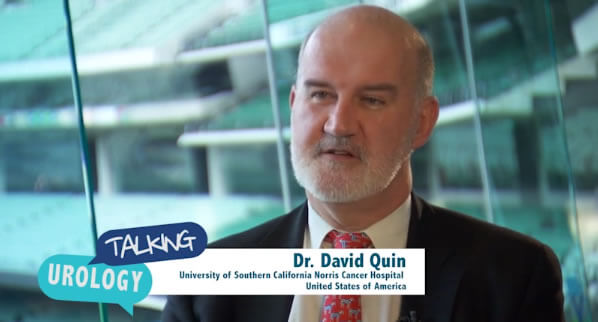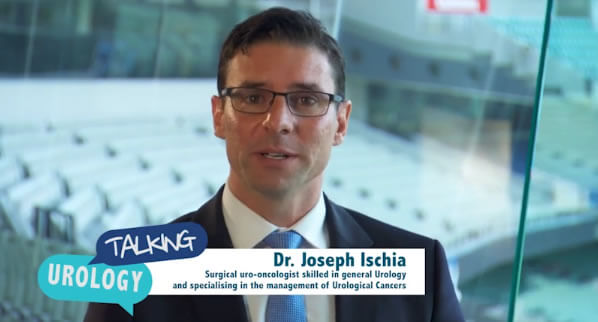Haryana Dhillon & Jasmine Yee talk about the beneficial role of exercise in patients with a cancer diagnosis with a particular focus on those with advanced cancers.
Dr Jasmine Yee has recently commenced as Piccioli Postdoctoral Research Fellow at the Centre for Medical Psychology & Evidence-Based Decision-Making, University of Sydney. Her research focuses on the role of exercise and physical activity on wellbeing in cancer patients.
Talking Urology podcast transcript
ANZUP 2019 Interviews – A/Prof Haryana Dhillon & Dr Jasmine Yee
Haryana Dhillon: I’m Haryana Dhillon from the University of Sydney. I’m also the chair of ANZUP’s Quality of Life and Supportive Care subcommittee and I’m here today talking with Dr Jasmin Yee. Hi Jasmine.
Jasmin Yee: Hi Hary.
Haryana: So, you’ve recently started working as a postdoc research fellow, so can you tell us a little bit about your new role?
Jasmin: Yes. So, we know that with prostate cancer that there’s a lot of unmet needs when it comes to supportive care and particularly side effect management. So, part of my new role is working in one of our Sydney metropolitan centers to try and identify what some of those issues are and to think about how we can implement some interventions to then address some of those holes. With a background in exercise science, I anticipate that many of the projects may be based around physical activity and exercise.
Haryana: Okay. It sounds really fantastic. So, tell us a little bit about how you think that the work that you did in your PhD in women with metastatic breast cancer and exercise might transfer or translate into supporting men with prostate cancer?
Jasmin: So, we know with exercise that the benefits are really well established around physical function and some of the psychosocial outcomes as well. But most of that evidence has been generated in very early stage cancers, so there’s a big paucity in metastatic disease. So, my PhD focused on the role of exercise and physical activity for women living with metastatic breast cancer. So, we had many of our participants who did have bone metastases present. What we found from that work was that by implementing a home-based resistance training and aerobic training program, that the women with metastatic breast cancer were able to safely complete the program. We also saw some trends in terms of improving some symptoms such as fatigue and also physical function. So, I think that work provides a really strong foundation for prescribing exercise in men living with metastatic prostate cancer. Given that the most common place of spread is to the bones.
Haryana: It’s fantastic. It’s really interesting to see the similarities between different types of cancer sometimes and what we can learn across the fields. I guess I’d be really interested to hear starting in a postdoctoral role, what’s that meant for your career, because you’re an early career researcher, how do you think that’s going to change what might happen over the next few years?
Jasmin: I think starting in this postdoctoral position has been really wonderful and will accelerate my career. For the last four years, I’ve been in a teaching position, so unfortunately the teaching has minimised the amount of time I can invest in research. So the biggest transition into this position is now being able to focus full time on research and having less pull in different directions, I suppose, with respect to teaching and other administrative responsibilities as well.
Haryana: Fantastic. So, much more of that protected research time that means you can focus on those questions. I think, I guess, one of the areas that we’ve kind of been talking about doing some work in is how you actually implement some of the work or the findings from other research studies. Have you thought very much about the particular challenges of implementation work?
Jasmin: So, I think when we come to talk about exercise, that those challenges are really clear. We now have evidence that exercise is beneficial. We have COSA statements that emphasize that exercise should imbedded as standard care, but we don’t yet see that happening in our cancer center. So, I think there’s a large component there around education for the clinicians who are dealing with or treating these cancer patients. And then, also of course the resources for who’s going to be able to develop these programs, is there even physical space let alone funding for an exercise physiologist or other specialists to deliver programs? It’s certainly going to be about being a bit innovative, I think, and thinking a little bit outside the box about how you can still deliver programs but in a way, that’s not going to be too resource-intensive necessarily.
Haryana: Fantastic. It sounds like we’ve got lots of work ahead of us.
Jasmin: We have our way cut out for it that’s for sure.
Haryana: Nice to talk to you today. Thanks for being here in Talking Urology.
Jasmin: Thanks for having me.










